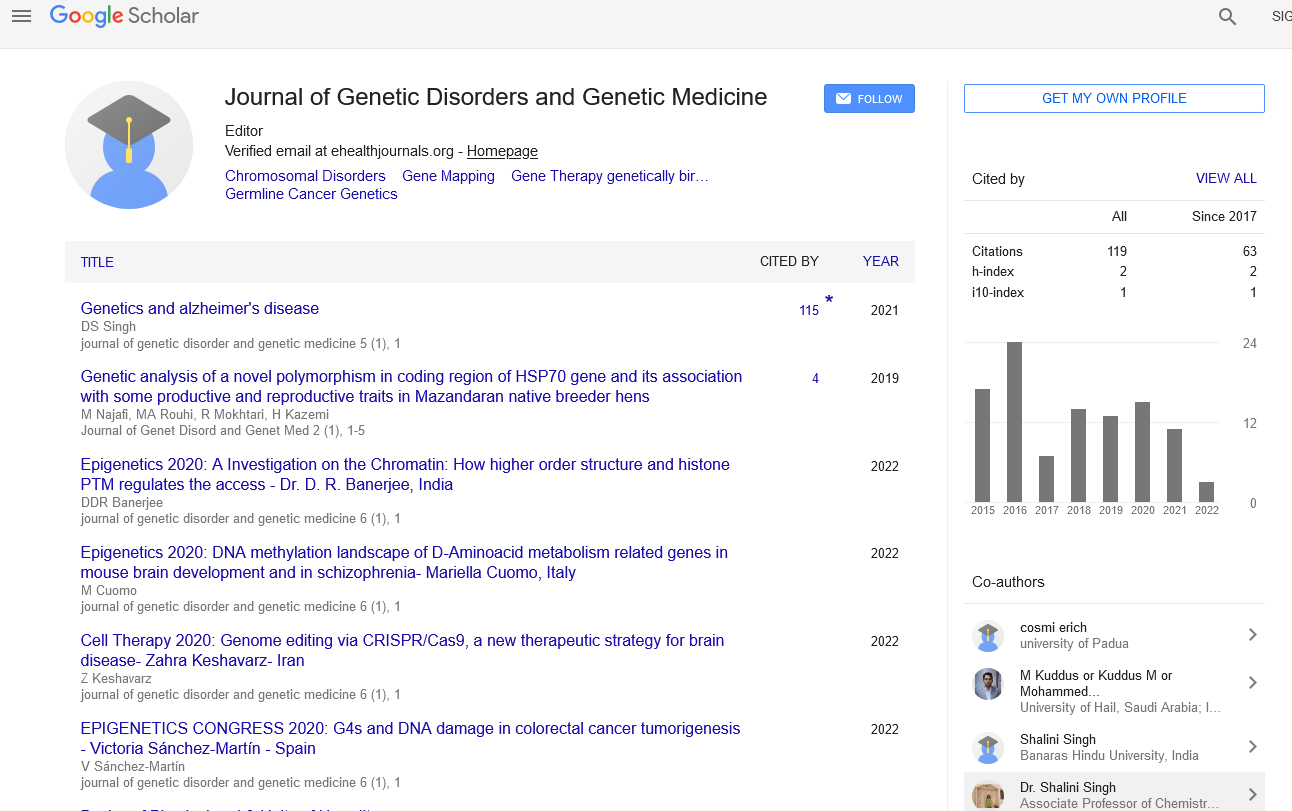Cancer genomics and global genetic information
Received: 18-Feb-2022, Manuscript No. PULJGDGM-22-3946; Editor assigned: 21-Feb-2022, Pre QC No. PULJGDGM-22-3946(PQ); Reviewed: 07-Mar-2022 QC No. PULJGDGM-22-3946; Revised: 11-Mar-2022, Manuscript No. PULJGDGM-22-3946(R); Published: 18-Mar-2022
Citation: Sotoudeh B. Cancer genomics and global genetic information. J Genet Disord Genet Med. 2022;6(1):1.
This open-access article is distributed under the terms of the Creative Commons Attribution Non-Commercial License (CC BY-NC) (http://creativecommons.org/licenses/by-nc/4.0/), which permits reuse, distribution and reproduction of the article, provided that the original work is properly cited and the reuse is restricted to noncommercial purposes. For commercial reuse, contact reprints@pulsus.com
Introduction
Possession of genetic somatic abnormality is a central to the cancer development, along with the inherent to genetic background of each patient in their risk of cancer and response to therapy. Current technologies give ever mostly the heavy approaches to study and confirm these phenomena which are highly complex. The Genetics of cancer specialty section will ease the publication of high-quality original research and articles review concern to the molecular, genetic and genomic aspects of cancer, and advances that facilitate progress in this field. Primarily focused on molecular genetic abnormality malignant driving processes in cancers of human, the submissions scope will include investigations in the following areas:
Discussion
Basic and rephrasing studies reporting large-scale metabolomics data and genomic (e.g. gene expression, DNA polymorphism, sequencing, copy number and epigenetics) and studies employing molecular cytogenetic techniques and classical techniques. Advances in statistical, bioinformatics and systems approaches to allow clinical interpretation of large-scale datasets and novel biological. Studies exhibit a connection of changes in genetic with clinical presentation and pathology. Genomics Genetics and RNA-based development of biomarker. Whole focused studies and genome studies of separate genes donate to cancer molecular pathways. New principle for bringing genetic molecular findings to the oncology clinical space. Cancer is a group of diseases of genetic that result from changes in the genome of cells in the body, leading them to grow confusedly. These involve mutations DNA changes in the genome. Our cells are continuously finding and join mutations that occur in our genome as the cells divide over and over again.
As cancer is a genetic disease, scientific studies investigating its diagnosis, causes, and treatment in developing countries need to focus more on genomics and genetics. The African population is not a equivalent group and as such involve the need for genetic studies to reflect the diverse African populations. The population of Africa shows that the people of Africa are the most phenotypically and genetically diverse population. The history of Africa has been described by Tucci & Akey and their reviews showed that ethnic groups of African and tribes are genetically mixed. Hence, there is likely a critical allowance of the underlying within-group genetic differences to the imbalance in cancer prophecy seen among Africans. Therefore, cancer genetics studies are look for to importantly impact the understanding the susceptibility, risk, diagnosis and treatment of this disease. The genomic heterogeneity of human populations was driven by migration of ancient ones and heterogeneous adaptive pressures on the genome of human, particularly on the Continent of African. These evolutionary events resulted in the split of populations of human into five distinct groups: northern Khoe-San, osouthern Khoe-San, West Africans, central African huntergatherers, and East Africans, out of which a subset migrated out of Africa and is recognized now as the out-of-Africa population.
Conclusion
Therefore, the African continent could be considered to the human repository of genomic diversity and serves as the reference for understanding the genomics role in human health justice. Repository is further deepened by the present-day by African populations enriched with the genetic pool. Still, Africa’s contribution to genomics and global genetic information is grossly out of proportion to its size and population’s diversity.





